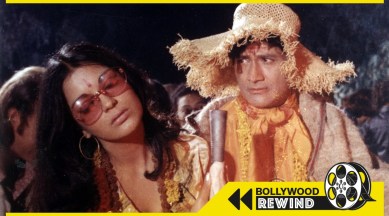Click here to follow Screen Digital on YouTube and stay updated with the latest from the world of cinema.

When Dev Anand-Zeenat Aman’s Hare Rama Hare Krishna released in 1971, the film was seen as an unconventional story. Centered around a brother-sister who were separated as kids, the film was set in Nepal in the midst of what was seen as the ‘hippie culture’ in the 1960s-1970s. The title, Dev Anand had once mentioned, confused the audience who first assumed that this was going to be a mythological story. But, Hare Rama Hare Krishna turned out to be an instant hit as it conveniently villainized an entire group of people whose lives were not seen as ‘ideal’ by the conservatives. With the hippie-anthem ‘Dum Maaro Dum’ and the still popular Rakshi song ‘Phoolon Ka Taaro Ka’, the RD Burman album was a hit but the biggest star of this film was the newcomer Zeenat Aman.
For the unversed, Hare Rama Hare Krishna is the story of Janice, played by Zeenat, who lives like a nomad in Kathmandu. Her carefree life revolves around marijuana as she believes that there is nothing more to this world than smoking up and chilling. Her disturbed childhood is shown as the cause of all her problems and marijuana, the film suggests, is her way of coping with her trauma. When she sings ‘Duniya ne humko diya kya? Duniya se humne liya kya? (What has the world given us? What have we taken from this world?)’, she effectively puts it out there that the youth couldn’t care less about the world and owes them nothing. The film, however, tells this story from the point of view of her conservative brother Prashant, played by Dev. Prashant is on a mission to save Janice and gets embroiled in a strange plot of smuggling that the film did not really need. There is also an unnecessary track with Prashant’s love story with a local girl, played by Mumtaz, that gets way more airtime than it ideally should. With its holier-than-thou approach, Hare Rama Hare Krishna appealed to the Indian audience, mainly because it hammered the message that anything that’s not traditional and isn’t acceptable by the society, ends with someone’s death.
And even though Zeenat played the not-so-ideal girl Janice, she was loved by the audience for her ‘bold’ role. Zeenat shared in an interview that no mainstream actor of the time wanted to play the role of Dev Anand’s sister even though it was the meatiest part in the film. “A lot of actresses had turned down the role because they wanted to play the romantic lead. Nobody wanted to play the sister,” she told The Times of India. By her own admission, she wasn’t well-versed in Hindi and gave her audition in English. Zeenat said that her personal style was pretty distinct and wasn’t commonly seen in Indian girls in those days, this impressed Dev Anand. In later years, Zeenat Aman became known for playing the good-bad, or the bad-good girl who changed how Hindi film heroines were perceived by the audience.
In his autobiography Romancing with Life, Dev Anand recalled that he decided to cast a new girl for the role of Janice. He described her as “Indian in looks but with a Western upbringing, someone who would not hesitate to smoke or to wear outfits that would accentuate her whimsical, carefree, to-hell-with-the-world attitude.” And when he first met Zeenat at a party, he was taken by her style. She had just been crowned Miss Asia Pacific and there was a spark between the two when they met for the first time. The first words, he recalled, that she said to him were – ‘I am your Janice, Dev.’
The idea for the film first came to Dev Anand when he was on a week-long trip to Nepal. He recalled in his autobiography that when he first spotted a brown-skinned woman who looked Indian with a group of hippies, he was quite shocked. Upon talking to her, he learnt her name was Jasbir, but she went by Janice and was in the city for a vacation. As he spent more time with her, he realised that this woman could be the core of his next film’s story. “The moment she left, the story idea and Jasbir, its central character, had formed themselves in my mind. I would call the film Hare Rama Hare Krishna,” he wrote.
Hare Rama Hare Krishna is one of those films that looks down upon everyone else who isn’t living within the confines of society. The film tries to highlight that drugs are a menace to the society but ends up as a confused mess trying to act as the moral-police of the society. Of course, it hasn’t aged well but the songs of Hare Rama Hare Krishna are just as good in 2022.
Click here to follow Screen Digital on YouTube and stay updated with the latest from the world of cinema.